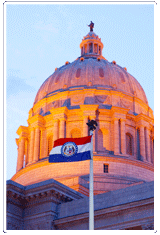JEFFERSON CITY — The Missouri Senate met on Monday afternoon to vote on a motion to return to the House for reconsideration its version of legislation that would make modifications to various tax credits in the state and establish new tax incentive programs designed to promote job creation in Missouri. Senate Bill 8, sponsored by Senate Leader Robert N. Mayer, R-Dexter, includes the combination of several existing performance-based credits to create “Compete Missouri”; the sunset, capping or elimination of a number of tax credit programs; and the creation of incentives to support an international trade hub at Lambert-St. Louis International Airport and attract amateur sporting events to Missouri. The version passed by the Senate is projected to save taxpayers nearly $1 billion over the next 15 years.
The main differences between the House and Senate versions of the economic development legislation remain to be the sunset dates on two tax credits: Low-Income Tax Credit and the Historic Preservation Tax Credit. The Senate’s version places a 2018 sunset on these two programs for developers of low-income housing and historic buildings; the House’s version ties the legislation to a proposed constitutional amendment that would allow, but not require, lawmakers to vote every four years (beginning 2016) on whether or not to maintain all tax credit programs. The two chambers also have differing opinions on other incentives to spur economic development in the state, most notably the “Compete Missouri” program.
Final approval of the Senate’s version of Senate Bill 8, which now rests in the House of Representative’s chambers, would send the legislation to the governor for his signature.
The Senate also considered a House bill that addresses presidential elections in the state. House Bill 3, handled in the upper chamber by Sen. Kevin Engler, R-Farmington, was introduced on the first day of special session to push back Missouri’s presidential primary from early February to early March for each presidential election year. The change was spurred by new requirements from national political party conventions. Each party in every state was to make necessary changes outlined by their respective national party conventions by Oct. 1 in order to avoid losing portions of their delegate count at national conventions, where each party’s presidential ticket is ultimately selected. The Missouri Republican Party elected to switch to a caucus system; the Missouri Democratic Party took no action on the primary issue.
A Senate substitute, sponsored by the bill handler, was offered that would forego the presidential primary for 2012 and then bring back presidential primaries beginning 2016. Several amendments were offered regarding the specific month in which the presidential primary should be held. Those in support of foregoing the presidential primary say votes submitted by Missourians would not necessarily bind party delegates as to who to select at the national convention, and not holding this specific election in Missouri would save the state money. Those in support of keeping the primary say both political parties would have more voter participation, as well as attract more candidates to visit and campaign in Missouri. However, the motion to adopt Sen. Engler’s substitute failed and House Bill 3 was tabled for further discussion, meaning Missouri’s presidential primary scheduled for Feb. 7, 2012, will occur.
For more information about the Senate Newsroom, call (573) 751-3824 or email newsroom@senate.mo.gov.
|








